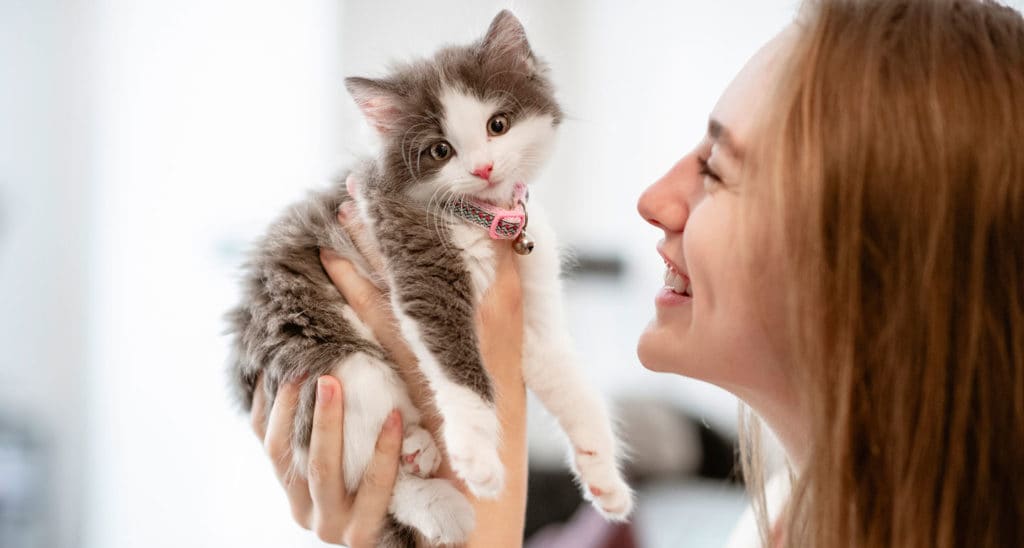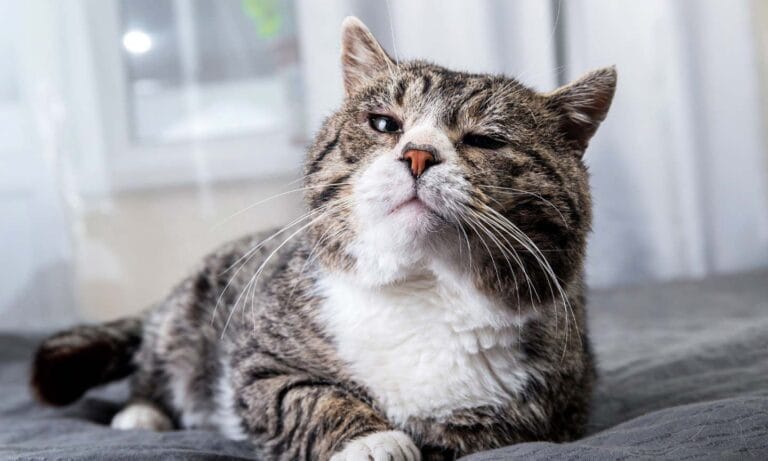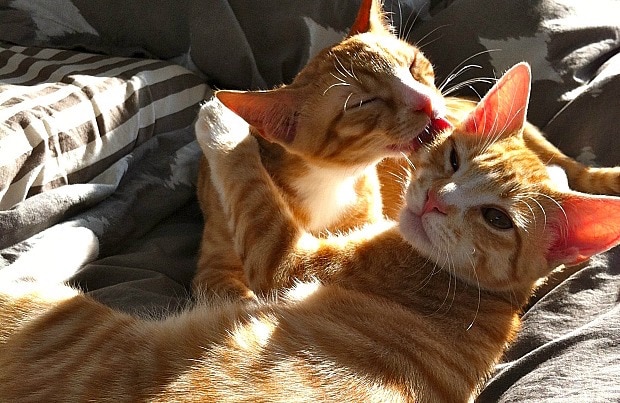Thinking about taking the plunge and getting a kitten? Kitten season, which starts in the spring and lasts through the summer, is the perfect time to adopt. What’s kitten season, you ask? It’s the peak mating season for cats, which results in an influx in cute, cuddly kittens ending up at our local shelters and rescues. (We guess us humans aren’t the only ones looking for a partner when the weather warms up!) Adopting a kitten during kitten season can help ease the strain on overcrowded shelters—and bring so much joy to your life! But should you get a kitten? Are you ready to become a cat parent?
Before bringing home a feline friend, you need to make sure you’re ready to care for one for the rest of their life. Here are six signs you’re ready for the adventure.
1
You understand a kitten’s personality takes time to develop.
Do you want a cuddler, or do you prefer an independent cat? Just like human babies, a kitten’s personality takes time to develop, which means you won’t really know what kind of personality your kitten will have until they get a bit older.
“As a kitten grows and matures, his or her personality develops, too,” says Dr. Julie Brinker, DVM, a veterinarian at the Humane Society of Missouri. “Sometimes you will find a kitten to be very affectionate and cuddly, but by the time he reaches a year old, he becomes more aloof. Or just the opposite could happen: You might have a timid kitten who really comes out of his shell as he grows and becomes comfortable in your home.”
Either way, you need to be comfortable with it—and even looking forward to watching your kitten’s personality change and develop. Hey, life is like a box of chocolates. You never know what you’re going to get. And that makes life all the more sweet!
2
You’re ready, willing and able to pay for necessary medical care.
Most cats and kittens adopted from a shelter or rescue organization will be up-to-date on vaccinations, and most shelters spay or neuter cats before they are adopted, according to Dr. Brinker. While adult cats may not need vaccines until the following year after adoptions, kittens will need to visit the vet much sooner than that.
“Kittens need a series of booster vaccinations and deworming before they are a year old,” Dr. Brinker says. “When the kitten is 4 months old, they will need a rabies vaccination, and if the kitten isn’t spayed or neutered by 4 to 6 months of age, that will need to be done as well.”
If you’re going to adopt a kitten, keep in mind that they will need follow-up veterinary care to ensure they are fully protected from common diseases and health issues. And as Dr. Brinker points out, this can get quite expensive.
3
You’re aware that kittens are fragile (in every sense of the word).
No, kittens are not made of glass. But they are experts at getting into trouble—more so than older, more mature cats—and, as a result, may get injured. Plus, Dr. Brinker points out, kittens don’t have as strong of an immune system as adult cats. They also haven’t received all of their vaccinations yet. And that means kittens are more likely to get sick if exposed to a viral or bacterial infection.
“It’s important to take your new kitten or cat to the veterinarian, even if vaccines aren’t needed at that time,” Dr. Brinker says. “The veterinarian will do a thorough examination, administer any necessary blood tests and will let you know the vaccine schedule that best suits your new pet.”
4
You don’t mind all that crazy kitten energy and mischief.
Kittens have a lot of energy—especially in the middle of the night or early in the morning when you have none. It’s important that you keep your kitten entertained and help burn off all that energy—in an appropriate way, of course—during the day. Otherwise, you are going to end up with a kitten who finds mischievous ways to entertain themselves, like destroying a roll of toilet paper. One way to avoid that is to stick to a consistent schedule and include a play session just before bedtime.
“Give your kitten a chance to burn off energy before it’s lights out,” Dr. Brinker says. “Throughout the day, make sure your kitten has plenty of toys, scratching posts and places to run and play.”
Dr. Brinker suggests purchasing a food puzzle or other interactive toys to help them stay busy. Interactive toys like Frisco’s Foldable Crinkle Play Tunnel, electronic toys like Cat’s Meow Motorized Chaser cat toy and a cat scratcher like Catit’s Lounge Scratcher with catnip are great options for keeping your kitten busy so they can burn off all that youthful energy.
You’ll also want to be sure to provide your kitten with hiding spaces and climbing opportunities. Cat trees, like Frisco’s 52- inch Faux Fur Cat Tree and Condo, are a great choice because they’re sort of like playhouses for kids—they can play with them but also hide away and take naps in them.
“You may even think about adopting two kittens at the same time,” Dr. Brinker says. “There are many great reasons why two is better than one, including that they can play and keep each other company.”
5
You’re 100% down for a long-term commitment
No commitment-phobes here! Cats tend to live longer than dogs, so if you’re going to adopt a kitten, you’re looking at roughly a decade and a half of commitment.
“On average, indoor cats can live to be around 15 years old, but many live to their late teens and even early twenties,” Dr. Brinker says.
Adopting any pet is a lifetime commitment, and there is more to being a responsible pet parent than just providing a roof over their heads.
“Pet parents must commit to meeting their pet’s physical and emotional needs for the pet’s entire life,” Dr. Brinker says. “That means always providing medical care, a nutritious diet and plenty of exercise.”
6
You have a plan in place for the future.
You might want a kitten really bad right now, but think about what your life will look like in a couple months from now or a year later or (gasp!) five years from now. A kitten might fit perfectly into your current living situation, but that may change. Are you graduating from college? Are you planning on having a child? It’s important to think about what your future plans are before getting a kitten. That way, you can make sure you can commit to providing them their fur-ever home.
According to Dr. Brinker, “one of the most common reasons people surrender cats to shelters is because they are moving and can’t take the cat with them.” If you’re going to adopt a kitten, Dr. Brinker suggests asking yourself the following questions early on:
- If you anticipate moving, will you be able to take your cat with you?
- Can you provide exercise and mental stimulation for your cat, even when you are tired or busy?
- Can you afford routine and emergency veterinary care?
- Do you have someone who can take care of your cat when you are out of town?
If the answer is no for any of these, then you might not be ready to adopt a kitten.
“But, if the answer is yes, check your local shelter,” Dr. Brinker says. “Many wonderful kittens are in shelters right now waiting for their forever homes!”
Read more:
Share:














